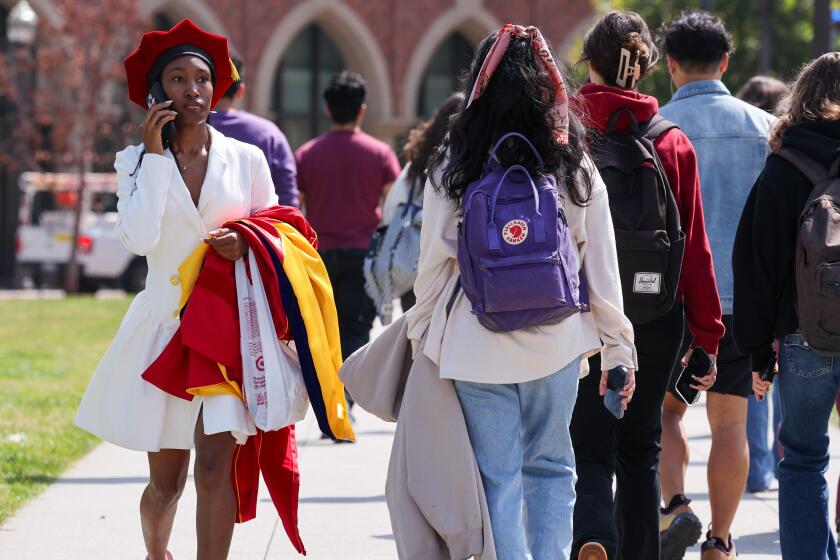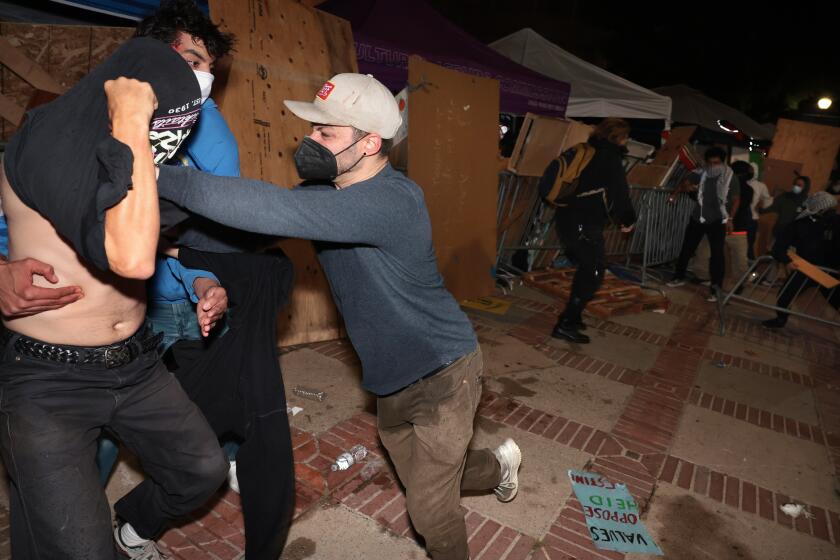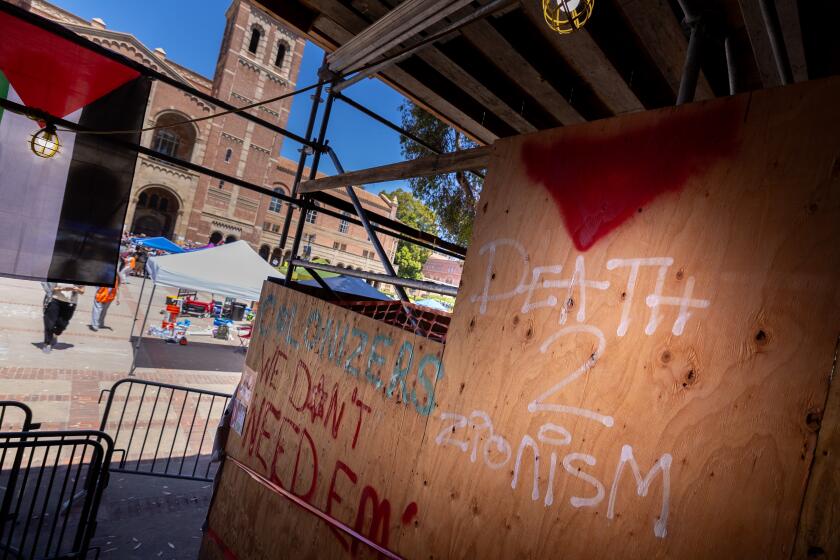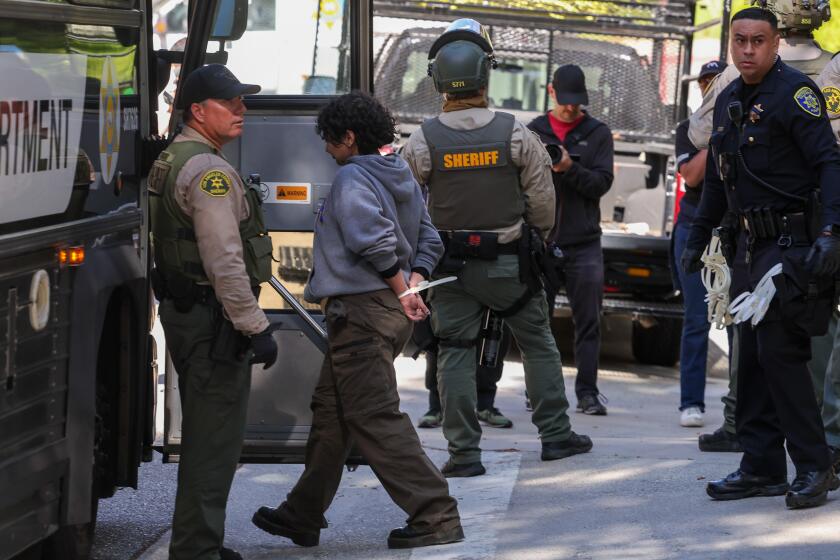UCLA chancellor faces growing faculty criticism, no-confidence vote, after weeks of turmoil
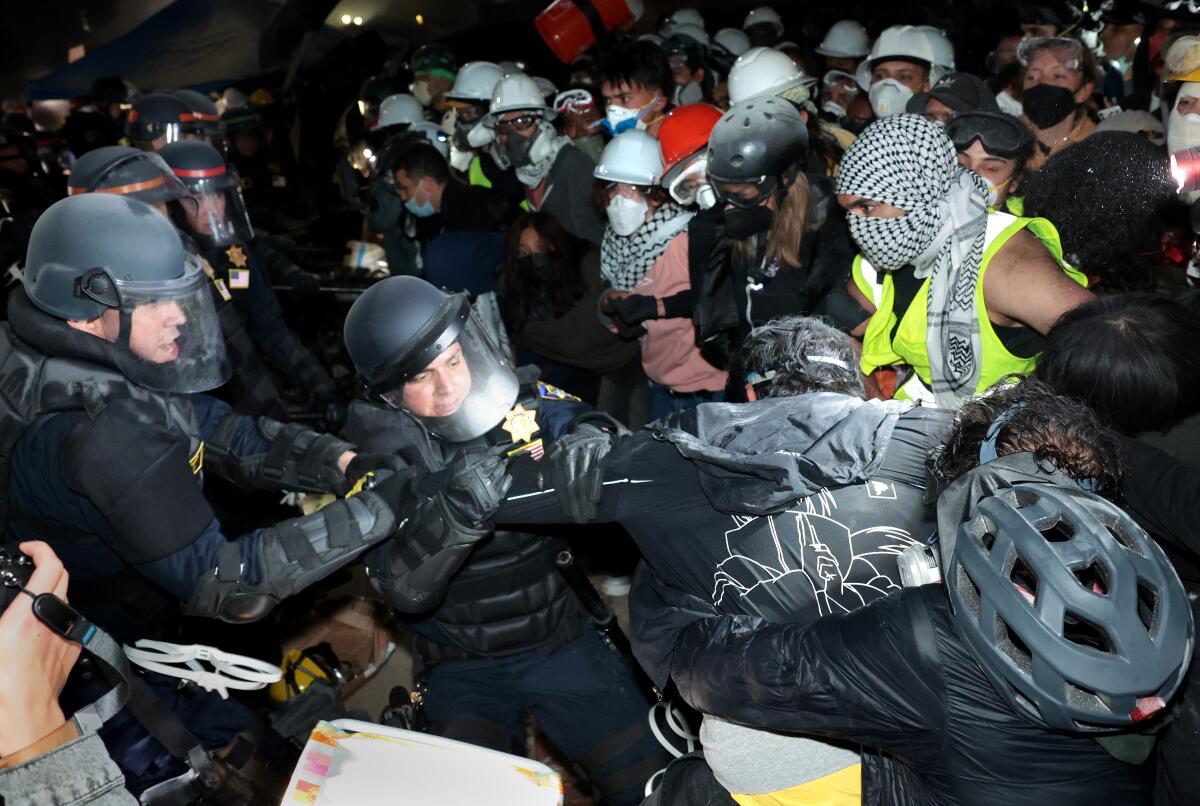
UCLA Chancellor Gene Block is facing faculty calls for his resignation and motions of no confidence and censure as criticism mounts against his leadership in the wake of a violent mob attack on pro-Palestinian protesters and a sweeping police takedown of their encampment that resulted in more than 200 arrests last week.
Representatives of the 3,800-member UCLA Academic Senate ‚ÄĒ made up of tenured and tenure-track faculty ‚ÄĒ are preparing to vote on separate motions for censure and no-confidence, both stating that Block ‚Äúfailed to ensure the safety of our students and grievously mishandled the events of last week.‚ÄĚ
The vote was scheduled for Friday but has been postponed to next week.
The vote has no legal power to force action, but it marks a grave moment for Block. The leader of the nation’s top public research university is completing the final months of his 17-year tenure, after steering the Westwood campus through a financial crisis and global pandemic to reach new heights by expanding enrollment, diversity, philanthropy and research funding. Last year, Block announced he planned to step down on July 31 and return to faculty research.
Other university leaders also have been criticized for their handling of campus protests, sparked last October when Hamas militants launched a deadly surprise attack on Israel and Israel retaliated with a massive bombardment of Gaza. Earlier this week, USC‚Äôs Academic Senate voted to censure the university‚Äôs president, Carol Folt, and provost, Andrew Guzman, after the widely criticized decision to cancel the valedictorian‚Äôs commencement speech due to unspecified ‚Äúthreats‚ÄĚ and controversy over an aggressive police takedown of a pro-Palestinian encampment.
The vote followed a nearly three-hour meeting Wednesday in which USC’s faculty members criticized the decisions of President Folt and provost Andrew Guzman.
UCLA declined to comment on the upcoming faculty vote.
Three weeks of turmoil at UCLA started April 25, when students set up an encampment in the campus’ grassy quad to express solidarity with Palestinians, condemn Israel’s actions in Gaza and demand that UCLA divest from firms that make and deliver weapons and services to Israel. The encampment was initially free of violence, with protesters engaged in teach-ins, art builds, yoga and other activities.
‚ÄúMany of us have personally witnessed the vibrant, respectful and highly disciplined learning [at the encampment],‚ÄĚ Chicano Studies department chair Charlene Villase√Īor Black said. ‚ÄúAnd university administration have gotten it wrong every time.‚ÄĚ
But UCLA Police Chief John Thomas said he advised campus leadership against allowing the encampment, as it violated rules against overnight camping. Inna Faliks, a professor of piano, said she and some other Jewish campus members felt targeted by protest chants, graffiti of expletives against Jews and blocked access to public walkways and buildings.
UCLA declared the encampment unlawful on April 30. Later that night, a violent mob attacked the encampment and students were left to fend for themselves against beatings, pepper spray and fireworks for three hours. Law enforcement in riot gear moved in during the early morning of May 1, but it took hours to quell the violence. Police later took down the encampment and arrested more than 200 people.
As incendiary claims ricocheted across group chats and were amplified online, a crowd converged on UCLA and violence ignited when police left the scene.
Since then, a number of people have been blamed for the debacle.
Before the Academic Senate meeting Friday, more than 900 faculty and staff members throughout the University of California system issued a list of demands. They included a call for Block’s resignation; amnesty for students, staff and faculty who participated in the encampment and peaceful protests; university disclosure of all investments and divestment from military weapon production companies.
‚ÄúFollowing the violent and aggressive police sweep of the Palestine Solidarity Encampment on May 2, 2024, resulting in more than 200 students, faculty, and staff arrested while peacefully protesting, it has become obvious that Chancellor Block has failed our university,‚ÄĚ the demand letter said.
Faculty who signed the letter represented various departments including those of mathematics, American Indian Studies, Near Eastern Languages and Cultures, Asian American Studies, history, Chicana/o and Central American Studies, African American Studies, and anthropology.
They spoke out about their demands Thursday, joined by a group of volunteer medics ‚ÄĒ representing about 100 UCLA medical students, nurses, residents and emergency medical technicians ‚ÄĒ who raised concerns regarding police brutality and the absence of medical help from the university after the attack. They said more than 150 students were attacked with pepper spray and bear mace, and at least 25 students were hospitalized for head trauma, fractures and severe lacerations.
‚ÄúUCLA Chancellor Gene Block‚Äôs and UC President Michael Drake‚Äôs statements minimize the severity of both the physical and psychological impact of their actions while attempting to justify the force they authorized against their students,‚ÄĚ a medic said in a statement.
Law enforcement fired ‚Äėless-lethal‚Äô rounds as the UCLA encampment was cleared, and protesters say they ‚Äėconnected with heads and hands.‚Äô
When police took down the encampment, medics said, more than a dozen students were evaluated for rubber bullet injuries and others showed contusions and musculoskeletal injuries.
‚ÄúWe strongly feel that Chancellor Block endangered the lives of our students, faculty and staff,‚ÄĚ said Michael Chwe, a political science professor who helped organize the demand letter.
Judea Pearl, a computer science professor, said Drake was ultimately responsible for the campus security failures. He said Block should not be blamed for failing to bring in a stronger police presence because he was a ‚Äúvictim‚ÄĚ of UC systemwide guidelines that direct campuses to rely first on communication with protesters and bring in law enforcement as a last resort.
‚ÄúHe was trying to protect the campus but had to follow the directive ... not to bring in police,‚ÄĚ Pearl said.
Another source, who was not authorized to speak publicly, said Block was in an ‚Äúimpossible situation.‚ÄĚ
‚ÄúIt‚Äôs impossible to square all of the circles of adhering to UC policy, shared governance with faculty and bitterly competing agendas still playing out nationwide,‚ÄĚ the source said. ‚ÄúTo his credit, he‚Äôs taking swift action on everything that‚Äôs in his control.‚ÄĚ
Other critics have blamed Thomas, the police chief. Three sources not authorized to speak publicly told The Times that campus leadership, even before the mob attack, had wanted to beef up security and authorized Thomas to bring in external law enforcement to assist UCLA police and private security with as much overtime pay as needed. But he failed to do so, they said, and also did not provide a security plan to campus leadership despite multiple requests.
Others said that Administrative Vice Chancellor Michael Beck, who oversaw the police department and Office of Emergency Management at the time of the mob attack, should step aside. Previous lapses are now being scrutinized, including his responsibility for not stopping the LAPD from using the UCLA-leased Jackie Robinson Stadium as a staging area for action against Black Lives Matter protesters in 2020 ‚ÄĒ which Block, Beck and others called a mistake and a violation of university values. Beck‚Äôs duties also include management of Bruin Woods, the university‚Äôs Lake Arrowhead facility, where two counselors alleged they were hazed and sexually assaulted by other counselors in 2022.
Beck did not respond to requests for comment.
At UCLA, the legacy of the encampment remains an issue of much debate, particularly among Jewish students.
There is much debate on campus leading up to the Academic Senate vote.
Pearl said a censure and no-confidence vote would send the wrong message to Block‚Äôs successor to refrain from strong leadership and instead pander to campus political sentiments, which he said would represent a ‚Äúcaving in‚ÄĚ to demands to cut business and academic ties with Israel. Chwe, however, said it would signify faculty‚Äôs strong views that the chancellor must be held responsible for student safety.
Drake has announced an external investigation into UCLA’s response, which Block says he welcomes as he conducts his own internal review. Drake has helped guide campus protest responses and was in the UCLA command center as law enforcement began taking down the encampment last week.
UCLA also has moved swiftly to improve security by creating a new chief safety officer position to oversee campus security operations, including the campus police department. Rick Braziel, a former Sacramento police chief who has reviewed law enforcement responses in high-profile cases across the country, is leading the new Office of Campus Safety as associate vice chancellor.
Some critics, however, said the move would further ‚Äúmilitarize‚ÄĚ the campus. UCLA deployed a larger law enforcement presence earlier this week, when campus police arrested 44 pro-Palestinian protesters gathered in a parking structure before a planned demonstration. Police said they carried equipment that could be ‚Äúused to unlawfully enter and barricade a building.‚ÄĚ Some students decried the arrests as harassment and intimidation. Classes were moved online for the rest of the week as a security precaution.
The Los Angeles mayor has criticized the university for lacking a better security plan, which led to the attack by a violent mob of counterprotesters on an encampment of pro-Palestinian demonstrators.
Differing opinions among faculty over the university’s response to student protests have created small rifts within departments, according to multiple faculty members.
Chwe said they are working to combat misinformation being spread to faculty members surrounding recent events and continue to hold conversations with their colleagues.
‚ÄúIt‚Äôs not only about dialogue with the university but also with our colleagues,‚ÄĚ he said.
Caroline Luce, a UCLA historian and member of University Council-American Federation of Teachers, which represents more than 3,000 non-senate faculty and several hundred professional librarians, called the atmosphere for UCLA faculty, particularly those not tenured like lecturers, ‚Äúdicey with lots of risk.‚ÄĚ
‚ÄúThere are reputations and interpersonal dynamics in departments that they have to navigate,‚ÄĚ she said.
John Branstetter, a UCLA lecturer in political science, was one of about 10 faculty arrested after police took down the encampment. He said the university’s crackdown on free speech on campus has not only made him fear for his students’ safety but for his own.
‚ÄúI do feel threatened by the general atmosphere that the administration is fostering through this continuing quasi-criminalization of free speech on campus, so I don‚Äôt know if they will try to get rid of me or the protections I have will be abided by,‚ÄĚ he said.
More to Read
Sign up for Essential California
The most important California stories and recommendations in your inbox every morning.
You may occasionally receive promotional content from the Los Angeles Times.
